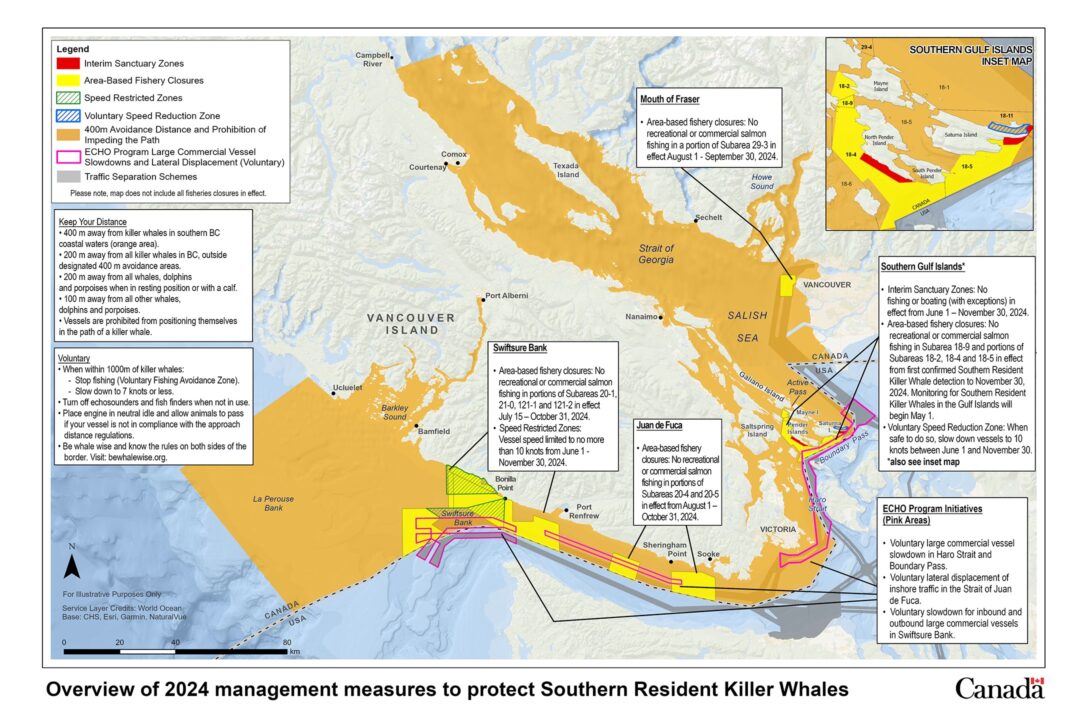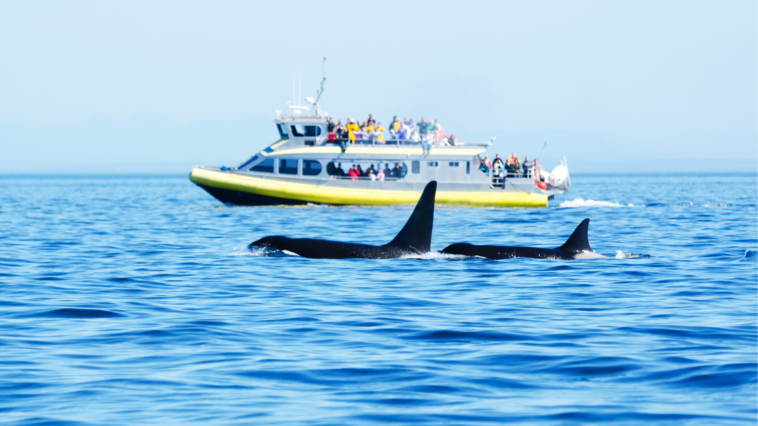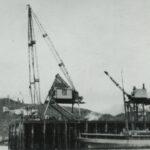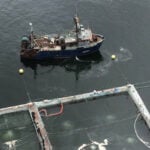New federal measures to protect endangered southern resident killer whales include closure of certain salmon fisheries and new slow-down zones, Transport Canada said in a release.
Unlike their relatives Northern Resident Killer Whales, a population that’s officially “threatened” but which is slowly increasing, Southern Resident Killer Whales are on the brink of extinction, recent studies warn.
The federal department said the changes apply to areas where the Southern Residents travel and feed. They aim to secure their access to a vital supply of Chinook salmon, and help guard them from noise and contaminants.
The affected recreational and commercial fisheries are near Swiftsure Bank, along southwest Vancouver Island and the mouth of the Fraser River, from June 1 to November 30, 2024. The mandate also includes two interim sanctuary zones – meaning no vessels or fishing – off Pender and Saturna Islands, from June 1 to November 30, 2024.
“Southern Resident killer whales need our help. That’s why for the sixth straight year we’re taking concrete action with our partners to create a quieter, safer environment for this iconic, vulnerable species.”
Pablo Rodriguez, Minister of Transport
Vessel speed limits near Swiftsure Bank are now in effect, until November 30, 2024. All vessels must slow down to a maximum of 10 knots in two speed-restricted zones. Boats must continue to stay at least 400 metres away from all killer whales, and are prohibited from impeding the orcas’ path in the coastal waters between Campbell River and Ucluelet, including Barkley and Howe Sound. This measure is in effect until May 31, 2025.
“Southern Resident killer whales need our help. That’s why for the sixth straight year we’re taking concrete action with our partners to create a quieter, safer environment for this iconic, vulnerable species,” said Minister of Transport Pablo Rodriguez in the release. Currently, the entire southern resident killer whale population consists of just 74 whales.

The Transport Canada announcement also includes new funding of $3.2 million over two years to the Vancouver Fraser Port Authority to continue the Enhancing Cetacean Habitat and Observation (ECHO) Program. This program “conducts ground-breaking research and coordinates voluntary threat reduction initiatives encouraging ship operators to slow down or stay distanced” in key southern resident habitats in Haro Strait, Boundary Pass, Swiftsure Bank and the Strait of Juan de Fuca.
“By supplementing our community science-supplied sightings with hydrophone alerts that detect whale vocalizations in real time, we expect to be able to provide even more alerts to keep whales safe from ship strike and disturbance.”
Dr. Chloe Robinson, Director of the Ocean Wise Whales Initiative
An additional $300,000 will support the Ocean Wise Whale Report Alert System, which uses an online app to notify commercial vessels when they are near whales. The alert initiative uses automatic detection from hydrophones to notify commercial vessels of nearby whales.
“By supplementing our community science-supplied sightings with hydrophone alerts that detect whale vocalizations in real time, we expect to be able to provide even more alerts to keep whales safe from ship strike and disturbance,” Dr. Chloe Robinson, Director of the Ocean Wise Whales Initiative, said earlier this year.
Ocean Wise asks the public to contribute whale sightings to its WhaleReport App, which it uses in combination with the WRAS data to prevent ship strikes on whales along BC’s coast. Vessel strikes have been an increasing concern off BC shores lately, as increased tanker traffic has resulted in increased collisions and whale deaths.





